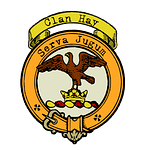Welcome back to "A Clan A Day Podcast." I'm your host, Colin MacDonald, and today, we're venturing into the rich and tumultuous history of Clan Gordon, a name synonymous with power, loyalty, and resilience in the annals of Scottish history. The Gordons, one of Scotland's most influential clans, trace their origins back to Normandy, with legends suggesting that their ancestors held significant lands there before crossing the English Channel with William the Conqueror in 1066.
The earliest recorded Gordon in Scotland is Richard de Gordon, who settled in Berwickshire during the reign of David I in the 12th century. The family quickly established themselves as formidable landowners, with Richard's descendants securing vast territories and marrying into other powerful families. By the late 13th century, Adam de Gordon emerged as a key figure, aligning with Robert the Bruce during the Wars of Scottish Independence. For his loyalty, Adam was granted the lordship of Strathbogie, later renamed Huntly, in Aberdeenshire—a title that would become central to the Gordon legacy.
The Gordon family’s influence expanded significantly under Sir Adam de Gordon, who was granted these lands for his unwavering support of Bruce. However, the Gordons' story is not just one of land and title; it's a saga of fierce loyalty and military prowess. The family played pivotal roles in many of Scotland's most significant battles. Sir Adam de Gordon, for instance, met his end at the Battle of Halidon Hill in 1333, fighting bravely for the Scottish cause. His descendants continued this martial tradition, with Sir John Gordon falling at the Battle of Otterburn in 1388 and Sir Adam Gordon at the Battle of Homildon Hill in 1402.
A key moment in the clan’s history came when Elizabeth Gordon, Sir Adam’s only child, married Alexander Seton. Their union effectively merged the Gordon and Seton families, leading to a powerful new lineage. Their son, also named Alexander, took the name Gordon and was later created the 1st Earl of Huntly in 1449 by King James II. From this point on, the Gordons were not just landowners but major players in Scottish politics, holding titles such as Marquis of Huntly and Duke of Gordon.
The Gordons’ rise to power was marked by their involvement in numerous conflicts, both within and outside of Scotland. They were staunch supporters of the Scottish Crown, particularly during the tumultuous reign of Mary, Queen of Scots. However, their allegiance to the Catholic faith often put them at odds with Protestant neighbors, leading to bitter feuds, especially with Clan Forbes. These feuds reached their peak in the late 16th century with the infamous Battle of Tillieangus and the massacre at Corgarff Castle, where 27 members of the Forbes clan were slain by the Gordons.
One of the most notable Gordons was George, the 4th Earl of Huntly, also known as "The Cock of the North," a title that became synonymous with the clan's leadership. His ambitions, however, led to his downfall when he rebelled against the Crown and was defeated at the Battle of Corrichie in 1562. Despite this setback, the Gordons remained a powerful force in Scottish affairs, with their influence extending into the 17th century during the Wars of the Three Kingdoms. The 2nd Marquis of Huntly, George Gordon, was a staunch Royalist, leading his famed Gordon Horse cavalry in support of King Charles I. This loyalty came at a high cost, with Huntly being captured and executed by the Covenanters in 1649, shortly after the execution of the King he had served so faithfully.
The Gordons were also central to the Jacobite risings of the 18th century, though the family was divided in their loyalties. While the 2nd Duke of Gordon supported the Jacobites in the 1715 rising, his son, the 3rd Duke, remained loyal to the British Crown during the 1745 uprising. However, the clan’s support for the Jacobite cause did not go unnoticed, with many Gordons, including Lord Lewis Gordon, playing crucial roles in the conflict, especially at the Battles of Falkirk and Culloden.
By the 19th century, the Gordons had firmly established themselves as one of Scotland's most prominent families. The 4th Duke of Gordon, Alexander, was a significant figure in both military and social circles, raising the famous 92nd (Gordon) Highlanders regiment, which would go on to distinguish itself in numerous battles, including the charge at Waterloo. His wife, the "Gay Duchess of Gordon," was a central figure in Edinburgh society, known for her charm and political influence.
The Gordon legacy extends far beyond the battlefield. Their cultural contributions, particularly in literature and the arts, have left an indelible mark on Scotland's heritage. The family’s architectural legacy includes numerous castles, such as Huntly Castle, Abergeldie Castle, and the magnificent Gordon Castle, which stands as a testament to the clan’s enduring influence.
Today, the chief of Clan Gordon is the Marquess of Huntly, and the clan continues to be celebrated for its rich history and contributions to Scotland. From their origins in Normandy to their pivotal role in shaping Scottish history, the Gordons have left a legacy of loyalty, bravery, and resilience that endures to this day.
Thank you for joining us on this exploration of Clan Gordon's history. Be sure to tune in tomorrow for another episode of "A Clan A Day Podcast." I'm Colin MacDonald, and as always, Go n-éirí an bóthar leat.













Share this post